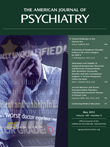Social Phobia and Social Anxiety Disorder: Effect of Disorder Name on Recommendation for Treatment
To the Editor: A decade ago, researchers (1) raised the question of whether the name “social phobia”—which initially described the fear of specific social situations such as public speaking or eating in front of others—contributed to a minimization of the impairment associated with the disorder. In fact, data suggest that social phobia may not be recognized, by patients or providers, as warranting treatment (2). Those with social phobia show greater delays in seeking treatment and considerable failure to do so at all compared with those with other anxiety and mood disorders (3). Recognizing the pervasive and impairing nature of the condition, the alternative name “social anxiety disorder” was included in DSM-IV.
Using data collected from a telephone survey of residents of New York State, we investigated whether the disorder name affects the perceived need for treatment. The Stony Brook University Center for Survey Research collected data between April and June 2011. Random-digit dialing was used to obtain phone numbers, and the adult resident with the nearest birthday was interviewed. In total, 806 people participated. Weights based on population estimates of six demographic variables (gender, age, education, race, region within New York, and income) were applied to compensate for lower response rates in some groups.
Respondents heard a brief vignette describing a person who experiences discomfort in social situations and often avoids social events. These symptoms were labeled as either social phobia or social anxiety disorder, and respondents indicated whether the person should seek mental health treatment. Fifty-eight respondents either replied that they did not know (N=40) or declined to answer (N=18). Of the remaining 748 respondents, 83.2% believed the symptoms labeled as social anxiety disorder warranted treatment compared with 75.8% who believed that symptoms labeled social phobia warranted treatment (χ2=6.34, df=1, p=0.012). However, the effect size was small (odds ratio=0.663, 95% confidence interval=0.443–0.905) and was not moderated by respondent age, gender, or ethnicity.
These findings are encouraging. Despite a slightly greater likelihood of recommending treatment for social anxiety disorder, the overwhelming majority of respondents endorsed seeking help regardless of diagnosis name. Although the impact of social phobia has been underestimated historically, efforts by researchers, health care providers, and the health care industry appear to have increased public awareness. Still, rates of treatment seeking among these individuals are low. Our findings suggest that using the term “social anxiety disorder” increases the likelihood that the condition will be perceived as requiring treatment. Making social anxiety disorder the official diagnostic label in DSM-5 is appropriate.
1. : Social phobia or social anxiety disorder: what's in a name? Arch Gen Psychiatry 2000; 57:191–192Crossref, Medline, Google Scholar
2. : Delays in referral of patients with social phobia, panic disorder, and generalized anxiety disorder attending a specialist anxiety clinic. J Anxiety Disord 2006; 20:363–371Crossref, Medline, Google Scholar
3. : Failure and delay in initial treatment contact after first onset of mental disorders in the National Comorbidity Survey Replication. Arch Gen Psychiatry 2005; 62:603–613Crossref, Medline, Google Scholar



